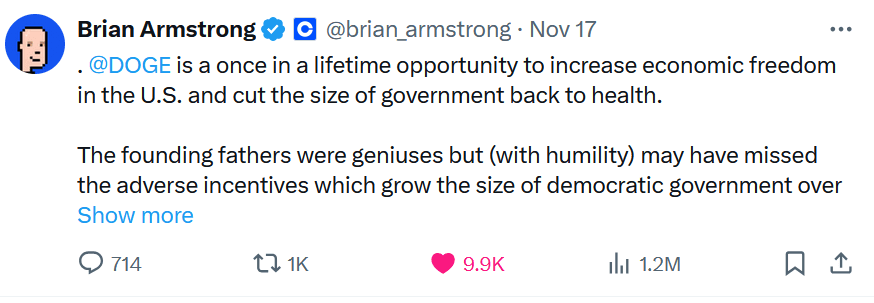In a move as audacious as it is polarizing, the Department of Government Efficiency (DOGE) initiative, co-headed by Elon Musk and Vivek Ramaswamy, is emerging as a potential blueprint for reshaping governance in the CyberSociety Era. Under the guise of streamlining state administration, DOGE could transform democracy into a form of tech-driven plutocracy, aligning government priorities with the interests of the tech establishment and its investors.
A Government by Tech, for Tech
DOGE (@DOGE) is marketed as a revolutionary partnership between public institutions and private innovation, promising to cut inefficiencies and foster economic freedom. Its backers, including Coinbase CEO Brian Armstrong, investor Peter Thiel, and venture capitalist Marc Andreessen, envision a government “built for the future” with technology at its core.
But scratch the surface, and DOGE’s agenda reveals a far more provocative hypothesis: a government subtly engineered to serve the interests of its creators. Musk and his allies have positioned DOGE as a vehicle to steer government investments into areas that align with Silicon Valley’s priorities—AI, blockchain, space exploration, and more.
Brian Armstrong’s viral tweet epitomizes this mindset, proposing constitutional amendments to cap government spending and a sovereign wealth fund to give citizens “skin in the game.” These ideas, while framed as empowering, could consolidate economic and political power among a narrow elite, accelerating a shift from democratic governance to technocratic oversight.
Public-Private Partnerships or Plutocratic Takeover?
DOGE’s vision aligns disturbingly well with the interests of the tech establishment:
- Centralized Influence: By promoting public-private partnerships, DOGE could give tech moguls unprecedented sway over policy decisions.
- Investment Alignment: Government funding could be funneled into projects that directly benefit tech giants and their investors, blurring the line between public service and private profit.
- Erosion of Accountability: A leaner government might sound efficient, but it risks reducing oversight and transparency, making it easier for powerful entities to act without checks.
The potential for misuse is evident. Musk’s leadership at X has already demonstrated how platforms can be used to amplify political agendas. With DOGE, Musk could extend this influence to government operations, making state administration a tool for advancing tech-aligned objectives.
The Role of X in DOGE’s Rise
X, Musk’s rebranded social platform, serves as the nerve center for DOGE’s messaging. Influential podcasters, influencers, and venture capitalists amplify DOGE’s vision, creating a groundswell of support among tech-savvy audiences.
DOGE’s feed on X uses buzzwords like “freedom,” “efficiency,” and “transparency” to build public trust, while simultaneously promoting an agenda that favors the tech establishment. The messaging, however, is one-sided, with critics often dismissed or drowned out.
A CyberSociety Model: Democracy Reimagined
DOGE could serve as the prototype for governance in the CyberSociety Era—a hybrid system where state power is shared with tech leaders. While this model may promise efficiency and innovation, it raises profound questions:
- Who holds power? In a system shaped by DOGE, are decisions made for the public good or private gain?
- What happens to democracy? If state administration is driven by corporate interests, does democracy devolve into plutocracy?
- How is accountability maintained? In a leaner government, who ensures that power isn’t abused?
The endorsements from Armstrong, Thiel, and Andreessen suggest a clear direction: a redefinition of government where technological innovation and economic freedom mask the consolidation of power among a select few.
The Future of DOGE: Innovation or Subversion?
DOGE is more than a department—it is a statement about the future of governance. While it promises to revolutionize state administration, its underlying agenda hints at a deeper transformation, one where democracy could give way to a tech-centric plutocracy.
As DOGE gains traction, the question is no longer whether technology can make governments more efficient—it’s whether this efficiency comes at the cost of democracy itself. Will DOGE be remembered as a tool for empowering citizens, or as the cornerstone of a new era of corporate-driven governance?
DOGE: The promise of efficiency, or the price of democracy? The answer lies in who wields the power—and for whose benefit.





